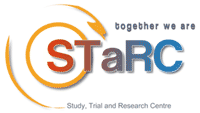Clinical Need for Exploitation of ACGT

Clinical trials are essential to achieve better treatments for patients. As a result of the Clinical Trials Directive 2001/20/EC the conduct of clinical trials throughout Europe has changed [1], [2]. The directive, aimed largely at holding pharmaceutical companies to higher standards, has tied up academic clinical research, particularly large trials, with redundant paperwork, liability tangles and unending bureaucracy.
Scenarios and structures that help to run more clinical trials and to bridge the gab between clinical and basic research is of utmost importance. The following problems in clinical care of patients do exist today:
- There is a time lack for physicians being kept informed about all the new developments in medicine, even in their specialized field. Every week hundreds of new papers are published. To find the most relevant, to read them all and to judge them as important for the own work is impossible.
- Today teamwork is of utmost importance. Physicians have to work in a collaborative environment to treat a patient with cancer. He always has to communicate and work together with other specialists in medicine. As a result a lot of so-called Cancer Comprehensive Centres are established to facilitate the interdisciplinary work. But up to now no IT infrastructure is supporting this by storing all relevant data in a database, so that every treating physician will have immediate access to the history, diagnosis, treatment and other relevant data of patients in an anonymous and secure way.
- Physicians face some difficulties to get feedback of how efficient they are working. Indeed, there is a lack of information concerning the survival of given patients compared to the survival of all patients with that kind of cancer. Such benchmarking would help health experts to guide their work.
- Physicians do not know enough about the possibilities of modern IT technologies that could help them to support them in daily care of patients, or in developing new clinical trials. The lack of this knowledge leads to a lack of requests and requirements to IT people for the creation of new and user friendly tools in this respect.
- Only a minority of patients is enrolled in prospective clinical trials. The reason for this is manifold.
- There exists no database for clinical trials with an easy way of access for physicians or patients in Europe. This is twofold unacceptable:
- A physician is not able to find the best trial that fits the need for his patient
- A trial chairman might build a new trial that is still running by another physician
- Today patients do use the Internet to get information about their disease. There is no way how a patient can trust such information. Often information is contrary and alienates patients.
- Even if patients do find relevant information, they may not understand the medical language used in these information.
- More patients are asking for second opinions regarding their disease. This is time consuming for physicians, expensive for the health care system and often unsatisfying for patients. They often get different and contrary answers resulting in the question: “And what shall I do now?”
A part of these problems are already faced and solved in ACGT. Main tasks for the future can be summarized in simplification of the clinical trial process and patient empowerment. By seamless integration of clinical, imaging and basic research data in single patients and cohorts of patients personalized medicine will get reality. In this respect ACGT provides an IT platform for the integration of largely distributed and heterogeneous data, a legal framework guaranteeing data security and patient privacy and tools for conducting and running trials as well as tools for querying and analyzing such integrated databases. To introduce this platform in the daily clinical care an organizational structure has to be built up mainly dealing with requests from clinicians and other stakeholders. Such a support is needed to coordinate the necessary cooperation of all stakeholders including clinicians, basic researchers, IT and legal people as well as pharmaceutical companies and at the end patients. For that purpose a Study, Trial and Research Centre (STaRC) is founded. This approach aims to build, run and analyze more clinico-genomic trials faster and more efficient. In addition training modules will help physicians and others to use the IT-infrastructure in an efficient way. To foster the acceptance and use of such an integrated platform with its tools in daily clinical practice the curricula of medical schools have to be changed in a long term. Increased knowledge of IT will benefit clinicians most and allow them to critically use data and tools of such a platform for the sake of their patients.
As ACGT is based on the principles of ‘Open Source’ future concepts of exploitation will follow these principles. From the perspective of ACGT a lot of components and tools will and have to be maintained. This includes the legal framework, the Portal, the Workflow generator, the ACGT Master Ontology, the mediator, ObTiMA and others. In the near future two clinical trials (the SIOP 2001/GOH for nephroblastoma and the EU-RHAB for Rhabdoidumour) will prospectively collect data by using the ACGT platform and tools like ObTiMA to evaluate the usability of ACGT and corresponding tools in the clinical setting. Nevertheless there is a long way to go from research tools to productive tools with certification for the daily clinical practice. This task has to be taken over and solved. It will be one other duty of STaRC.
Norbert Graf, USAAR
Andreas Persidis, BIOVISTA
Nikolaus Forgó, LUH
Manolis Tsiknakis, FORTH
1 Keim B: Tied up in red tape, European trials shut down. Nature Medicine 13:110, 2007
2 Pritchard-Jones K: Clinical trials for children with cancer in Europe – Still a long way from harmonisation: A report from SIOP Europe. European Journal of Cancer 44:2106-2111, 2008

